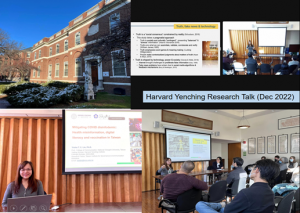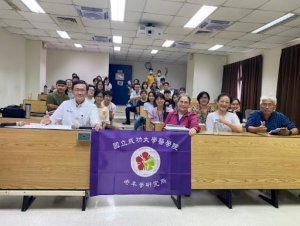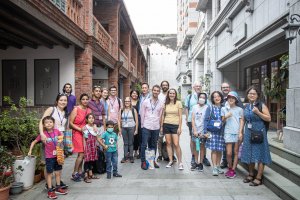Having been an international educator for more than ten years, my entire career has been focused on supporting and enhancing internationalization efforts at various institutions. Several years ago, I attended a session on the Fulbright International Education Administrators (IEA) seminars at a NAFSA conference. In this session, attendees mentioned the invaluable opportunity they had to participate in the Germany seminar. Little did I know that I, too, would be afforded such an opportunity of tremendous personal and professional value. Senator J. William Fulbright had a vision to make the world a more peaceful and friendly place through his programs. I believe the Fulbright IEA seminar is a prime example how we, as international educators, can help bring “a little more knowledge, a little more reason, and a little more compassion into world affairs” through unwavering commitment to our work, institutions, faculty and students.
Upon learning that I had been accepted into the program, I was thrilled to make my second trip to Asia. I first went to Asia a few years ago when I visited Florida Atlantic University’s exchange partner, Chulalongkorn University, in Bangkok, Thailand; it was a memorable, first-hand experience of an Asian culture that I welcomed and continue to treasure. I knew there would be both similarities and differences between my trips to Taiwan and Thailand, and Taiwan exceeded all of my expectations. I now have a deep admiration for both the people and cultures of Thailand and Taiwan.
Aside from the similarities in landscape and architecture to Thailand, one of my first observations upon arriving in Taiwan was the friendliness of the taxi driver and hotel staff. When I asked my taxi driver if the program covered taxi fare, he stated that it was rather than pocketing the extra cash as some dishonest cab drivers might do in the United States. Soon, I would find out that one of Taiwan’s greatest resources lies in its human capital and the truly one-of-a-kind altruism of its people.
On our first day of the program, we connected with Fulbright IEA seminar participants and the Fulbright Director and staff members over authentic Taiwanese cuisine. We visited the Fulbright Taiwan office to learn about the origins and specifics of the Fulbright program along with the history and background of Taiwan. I found the Taiwan overviews presented by the Fulbright Director, Dr. William Vocke, and representatives at the Ministry of Education (MOE), the Ministry of Foreign Affairs (MOFA), and the American Institute of Taiwan (AIT) of utmost value in the program. Through these presentations, I learned a tremendous amount about Taiwanese history, politics, economy, and education from those directly involved in promoting education in Taiwan.
It goes without saying that another highlight of the program was the institutional visits. While on the program, Fulbright IEA participants had the opportunity to visit 16 different institutions throughout Taiwan, from Taipei’s National Taiwan University to Tainan’s National Cheng Kung University, research institutions to an art school. The institutional visits included Soochow University, National Taiwan College of the Performing Arts (NTCPA), Tamkang University (TKU), National Taiwan Normal University, Academia Sinica, National Chengchi University (NCCU), National Taiwan University (NTU), Taipei National University of the Arts (TNUA), Chang Gung University (CGU), Ming Chuan University (MCU), National Chiao Tung University (NCTU), National Tsing Hua Universiyt (NTHU), National Cheng Kung University (NCKU), Wenzao Ursiline University of Languages (WTUC), National Sun Yat-Sen University (NSYSU), and National Taitung University (NTTU). Each institutional visit provided us with an overview of the university and a wealth of information on the breadth and depth of programs offered. We were able to network efficiently at these meetings, often with university decision-makers, and receive direct answers to our questions. On some occasions, we had more time to learn about the institution and its programs through lunch, dinner or a tea gathering. At every visit, the diversity of both the Taiwanese institutions we visited and the U.S. institutions and positions we seminar participants represented reminded me of the ultimate goals of connection and reciprocity.
My final program highlights included visiting cultural sites and English Teaching Assistant (ETA) programs throughout Taiwan. The ETA visits were each unique, and we were able to learn directly from the student assistants and teachers. On one ETA visit, we were able to witness impressive inventions created by the students. On another, a group of students performed a traditional song and dance for us. It is in these moments of cultural exchange and demonstration where the importance of international education truly shines through for me, where culture and education unite to inform and advance society.
We visited a variety of cultural sites through this program including the National Palace Museum, the National Chiang Kai-shek Memorial Hall, Yingge Ceramics Museum, Yingge Old Street, Taiwan Confucian Temple, Koxinga Temple, Fort Provintia, the National Aquarium, the National Pre-History Museum, and the Fifi Aromatic Plant Museum. All of our visits provided different historical, scientific, and artistic contexts from which to view Taiwan. These sites added value to the program by showing us what makes Taiwan truly unique and demonstrating what it can offer those who visit, research, study or teach in the region.
The Fulbright IEA seminar to Taiwan was truly an invaluable experience for me both personally and professionally; I made professional contacts with individuals at Fulbright, MOE, MOFA, AIT, 16 Taiwanese institutions and 10 American institutions. This seminar afforded me opportunities to learn more about Taiwan directly from its organizations, people, and the sights and sounds offered in the program. I am looking forward to the potential of establishing, and further developing, collaborative projects and initiatives with the institutions and individuals I met through this program and promoting the invaluable opportunity to visit Taiwan.







